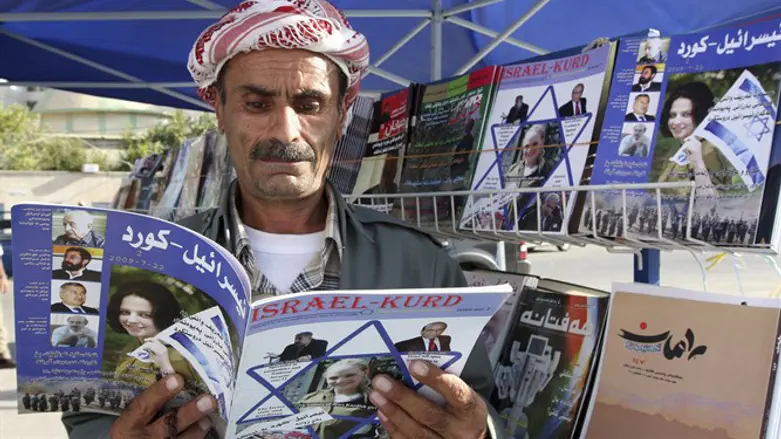
Despite a reported terror threat by the Islamic State terror group, 500 people attended a sold-out screening in New York of a film about Kurdish fighters and a talk with its director, the French-Jewish philosopher Bernard-Henri Levy.
Police provided heavy security at the Museum of Jewish Heritage – A Living Memorial to the Holocaust Monday, complete with sniffing dogs and dozens of officers following the threats, claimed to be issued by the terrorist group, NBC reported.
Levy, who has produced a number of films in conflict zones, spent many months documenting in “Peshmerga” the fight of the Kurdish male and female combatants for whom the film is named against ISIS. A supporter of Kurdish sovereignty, he was in the Iraqi-Kurdish capital of Erbil when a majority of voters in a controversial referendum supported independence.
Levy was able to board one of the last flights out of Erbil and arrive in New York in time before the Iraqi government blocked the airspace of the Kurdish enclave as punishment for the local Kurdish authorities’ decision to go through with the referendum despite Baghdad’s opposition to it.
The United States’ Department of State said it was “deeply disappointed” by Kurdish regional government’s decision, warning the vote could “increase instability.” Publicly Israel supported neither the vote in Iraqi Kurdistan, which has trade and friendly relations with Israel, nor opposed it — a neutrality many observers believe is rooted in Israel’s desire not to sour its already strained relations with Turkey.
Turkey under Recep Tayyip Erdogan, the country’s president and leader of the Islamist ruling party, opposes Kurdish independence both in Iraq and in Turkey, which has a large Kurdish minority that international observers say is oppressed.
Levy told JTA that Israel should come out in support of independence for Kurdistan, where he said he witnessed many expressions of solidarity and admiration for Israel, including during the vote Monday.
Though supporting Kurdish independence may complicate Israel’s relations with the Turkish government, which have declined amid expressions of hostility by Erdogan in recent years, doing so will not alienate millions of secular and liberal Turks, “who also recognize the Kurdish right” to nationhood, Levy said.
For Kurds, he added, the relationship with Israel “goes beyond an alliance. It is a brotherhood.”
Levy was among several Westerners in Erbil who saw Israeli flags being waved on the day of the vote — a gesture he interpreted as reflecting “deep admiration for Israel” and a sense of kinship felt by many Kurds toward the Jewish state.
“I had never seen anything like this anywhere in the Middle East — except Israel,” said Levy, who travels the region extensively and has toured Libya during its bloody civil war in 2011.
The 7 million Kurds living in Iran, Iraq, Syria and Turkey are “a minority surrounded, besieged by 200 million people and hostility. And you can’t compare their situation to Israel, it’s different, but there are similarities and they feel those similarities.”
More generally, he said, a viable Kurdistan “represents a triumph for moderate Islam. For women’s equality and for the values that many people in the West, and Jews especially, share with Kurds.”